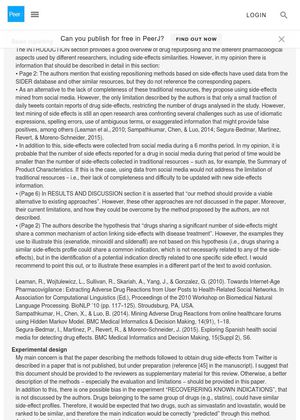Peer Review of Computational Drug Repositioning Based on Side-Effects Mined from Social Media
February 2016

TLDR Reviewers suggested the study on finding new drug uses through social media side-effects needs better methods and clearer limitations.
Seven years ago, a peer review was conducted on a study titled "Computational drug repositioning based on side-effects mined from social media". The reviewers raised concerns about the study's methodology, including the division of data into training and testing sets, the limitations of the Consumer Health Vocabulary (CHV) used, and the annotation of tweets. They suggested potential overfitting of a Support Vector Machine (SVM) classifier if the tweet data was divided randomly. The reviewers also questioned the study's assumption that drugs with similar side-effects might share a common mechanism of action. They recommended reframing the study as a way to identify drugs with similar mechanisms rather than a drug repositioning study. The reviewers also highlighted the study's limitations, including its reliance on unpublished work and the quality and reliability of data from social media. They suggested that the authors needed to provide a better description of the study's limitations and clarify their experimental design and evaluations.